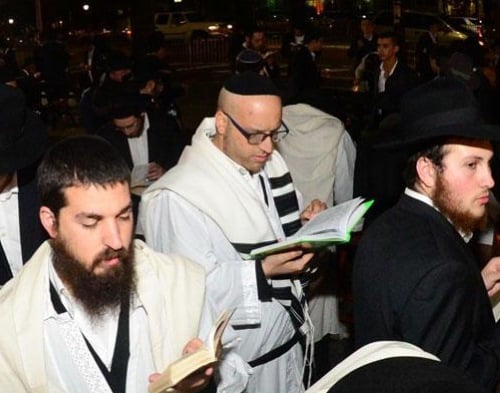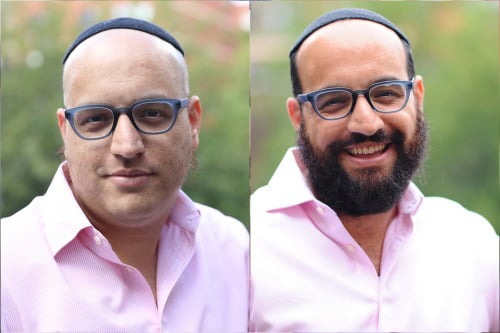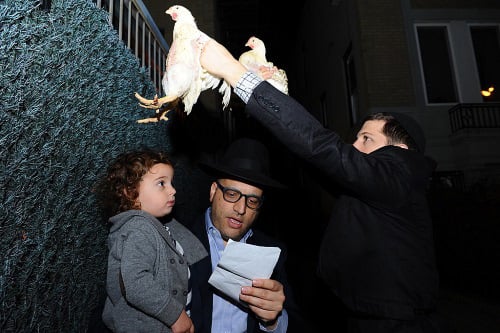|
Getting your Trinity Audio player ready...
|
By Bentzi Sasson(Chabbad.org)
Yom Kippur 5775. The giant sanctuary at Lubavitch World Headquarters in the Crown Heights neighborhood of Brooklyn, N.Y., was beyond full. The climax of the day—the final Neilah prayer—was beginning, and the atmosphere in the Rebbe’s synagogue was growing more and more intense.
I found myself standing alone on the high Torah reading platform in the center of the synagogue, completely covered in my tallit, trying as hard as I could to be as inconspicuous as possible. Around me, thousands of people were standing pressed together like sardines. I saw that each and every individual was trying his utmost to use the closing moments of this holiest of days for heartfelt prayer and introspection, pouring out their hearts before their Father in Heaven.
The words had added meaning for me this year. I read and I sobbed. I tried to wipe away the tears, but I could do nothing to stop the powerful sobs from racking my body. Standing above a sea of people crying out the words of the prayers caused me to dissolve in a sea of teary emotion.
* * *
It’s been five months since the dark day I was told that I had cancer. During those months, I underwent invasive treatments that have changed my life forever. In the beginning, it was all about fear of the unknown, dreading what lay ahead. Afterward, it was the regimen of chemotherapy that left me broken, a shell of my former self.
Three months of massive treatments with countless side effects: pain, suffering, despair, depression. My physical appearance changed as well. The hair on my head began to fall out, as did the beard I’d grown since I was a teenager. My face became pale, and my eyebrows and eyelashes disappeared. By the end, I was left with no hair at all.
From the very beginning, I knew that the only way I’d come out on top was to keep positive and maintain my faith, following the Chassidic adage: “Think good, and it will be good.” And I followed through to the best of my abilities. I made sure to attend prayers as often as possible, to speak to my friends and smile frequently. Even as strangers averted their gaze, and even as friends of mine walked past without recognizing me, I made sure to keep positive.
Thankfully, I was surrounded by loving family and loyal friends. They did whatever they could—and more—to support me, to give me strength and to help me stay on course. My wife, Devorah Leah, and my three young children were the light at the end of tunnel that kept me focused and positive through the darkest of moments.
Just a few days before Rosh Hashanah, I received the sweetest news: The treatment had done its work, and I was completely cancer-free. I smiled from ear to ear, like I had not smiled in many months.
Yom Kippur came, and my body was still battling the massive doses of toxins that had destroyed the cancer. I was afraid of what 25 hours with no food or water would do to me. I had already been admitted once due to dehydration and did not want to repeat the experience.
But not to fast on Yom Kippur? Unthinkable.
After speaking to a number of rabbis, it became apparent that the most important thing on Yom Kippur was not to eat or drink, even if would come at the expense of synagogue attendance. They advised me to stay home and rest up as much as possible for the duration of the fast.
I wasn’t thrilled by the prospect. On one hand, I wanted to pray with everyone else—to soak up the special atmosphere that pervades the synagogue. After all that I had experienced, I felt I needed that extra jolt of inspiration. On the other hand, I also realized that I needed to care for my body.
At the end, I decided to stay home and make the best of my situation. There was just no way that I could risk the crushing crowds that converged on shul during the holidays.
As the holy day wore on, my heart became heavier and heavier. I yearned to be with everyone else, to pray, to sing to feel spirituality so tangible you can almost touch it with your finger.
Suddenly, the door of my home opened, and there was my dear brother, Shmuel.
Knowing how I felt, he decided to ask the synagogue officers if they could make a special allowance for me. After the Musaf prayer, when there is a short break in the services, he asked if I could perhaps be allowed to stand alone on the Torah reading platform in the center of the synagogue for the closing portions of the day’s service, explaining that I’d otherwise not be able to attend.
With the assurance that an exception would indeed be made, my brother ran to my house to share the news. I was so happy! I was afraid, too, but I recognized that this was a unique opportunity that had opened up just for me. And I decided to go for it.
And so I found myself towering above thousands of my peers in the synagogue that is the heart and soul of the Chabad-Lubavitch movement. I did not look like a typical Chassid. My beard was just beginning to grow back, and I knew that people would be gawking, so I decided to drape my tallit over my head and create a safe space for me to be alone with my Creator.
And there I was, sobbing into the woolen folds of my tallit, overcome by the experiences of the past months. As the memories flowed freely, they merged with the prayers swirling around me. The haunting melody of Avinu Malkeinu (“Our Father, Our King”) being sung by the entire congregation was powerful enough to shake the strongest of edifices, and I was far from strong at that moment.
A half-hour after the fast had ended, I found myself home, gratified and thankful to G‑d for giving me the strength to complete the fast and pray among my fellow Chassidim.

* * *
A few days later, I step into my office and meet my friend and co-worker, Velvel. As he approaches, he says: “Bentzi, there is something I must tell you.”
“As the prayers were coming to a close on Yom Kippur,” he begins, “I felt a tap on my shoulder. I turned around and came face-to-face with an acquaintance of mine. He’s gesturing to the reading platform where you were standing and muttering, ‘Look where things have come to. There he is on the very same platform where the Rebbe would stand on Yom Kippur, shamelessly flaunting his shaved face. I can tell he’s not just a visitor. He looks like he grew up here, and he should know better than that.’
“I was shocked,” my friend continued. “I knew what you went through, and I couldn’t believe that someone would judge you so callously. Finally, I managed to reply: ‘You should just know that the fellow on the platform is a friend of mine, and I wish you that you never go through what he went through this year.’ He still didn’t get it, so I told him how you were less than a month after chemotherapy and your stubble was actually the first beginnings of what you hoped would soon be the luxurious flowing beard you had sported your entire adult life.
“I then turned to him and told him, you just learned the best lesson you possibly could this Yom Kippur. Never ever judge anyone. You never know what’s going on in someone else’s life.’ ”
It took me a few minutes to recover from the magnitude of what he had told me. When I finally managed to stand up, I knew what my New Year’s resolution would be as well: never to judge anyone!






